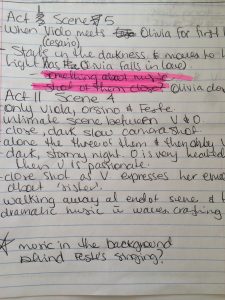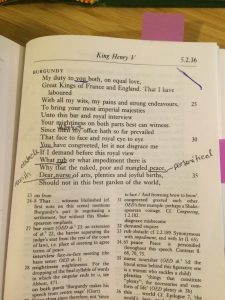My approach and habits for taking notes have similarities and differences when it comes to play-text versus watching a film version of a Shakespeare play. The better the notes, the easier it is for me to find what I’m looking for quicker, look back and understand what I was interpreting and remember the most important details.

When I am watching a film interpretation of a Shakespeare play, I will have the script of the play with me as well as my notebook to take notes. While watching I will pause the film whenever I feel something essential has happened that I should be noting. I will find the scene in the book and will scan or re-read the scene, depending on how well I remember it, then will compare the language: Is it an exact replica of the language in the Shakespeare script? Were word and/or lines omitted or changed? Characters: How are the characters visually interpreted in the film? How do the actors portray the character versus how I felt the character would look while reading the play? Setting: Is it time appropriate? Modern? What location choices did the director decide would suite this play and their interpretation of it? Music: Is the film score original to the film? Is it modern music easily recognizable? Is it loud music? Soft music? Continuous or in and out? I will also write down the scene and act from the play as well as the time on the film so that I can easily find it later, if needed. Once I feel I have written down what I will need to remember and what I feel is essential I continue with watching the film will again pause and do the same when pertinent. I do not annotate directly on the script while I do my notes for film-review. This is an area where I see I can improve. If I wrote directly on the text I would have had an easier time understanding my notes written in my notebook and where exactly in the play I could draw connections.
 While reading a Shakespeare play my first and most important habit is to use a version of the play which includes definitions on the page. I will lookout for words I don’t understand and write them directly over the word in the text. I will look for word-play and grammar specific to Shakespeare: his use of puns, double-meanings, metaphors and personification. My main technique for note taking is by annotating while I read. I find this keeps me more involved in the text and less likely to lose my train of thought. If I run out of room in the margins, I add post-it notes to the pages to continue with my annotating. I find this can become very overwhelming when I go back to review my annotated notes and I have been trying to use my notebook more for notes when reading a Shakespeare play. Another habit I have recently been trying to change is to use a pen to annotate instead of a pencil. The pencil smudged and it creates a messy and sometimes unreadable annotation.
While reading a Shakespeare play my first and most important habit is to use a version of the play which includes definitions on the page. I will lookout for words I don’t understand and write them directly over the word in the text. I will look for word-play and grammar specific to Shakespeare: his use of puns, double-meanings, metaphors and personification. My main technique for note taking is by annotating while I read. I find this keeps me more involved in the text and less likely to lose my train of thought. If I run out of room in the margins, I add post-it notes to the pages to continue with my annotating. I find this can become very overwhelming when I go back to review my annotated notes and I have been trying to use my notebook more for notes when reading a Shakespeare play. Another habit I have recently been trying to change is to use a pen to annotate instead of a pencil. The pencil smudged and it creates a messy and sometimes unreadable annotation.
I find the habits I have developed throughout my education have for the most part helped me, however, they can become messy and in that sense I do require improvement. As Shakespeare can often be perplexing to read or watch I believe the best habit is patience and to know it will require some interpretation. Good note taking is imperative to obtaining an understanding of Shakespeare.
Leave a Reply
You must be logged in to post a comment.